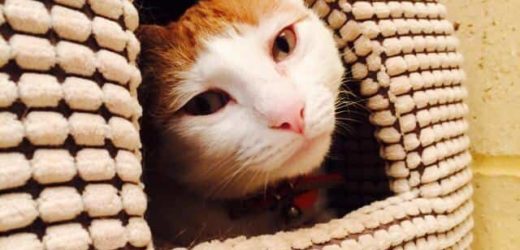Keeping your Cat Healthy & Happy

Unlike us, our pets can’t speak for themselves. In many cases, they won’t tell you when something is wrong. In order to keep our pets healthy they need regular trips to the vet, even If you check your cat at home, veterinarians are trained specialists and have the equipment and expertise that allow them to find something that you may have missed. It is essential that kittens are taken to the vet on a regular basis for a check-up and vaccinations. Young cats are also more susceptible to disease and infection, so don’t hesitate to take your kitten to the vet if you suspect any illness is present. Please, please take your cat for routine check-ups and take them immediately if you suspect something is seriously wrong. If you’re unsure or are seeking advice on your cat’s health, many vets offer phone consultations, which will save bringing your kitty in and causing unnecessary stress.
You can take a number of steps to prevent your cat from getting an illness, and it is important to uphold these measures for both your wallet and cats safety.
Neutering/Spaying your Cat
The one seemingly obvious thing that can keep your cat in a healthy condition is neutering. Unless you have a pedigree cat and are planning on breeding, it would be a really good idea to get them neutered.
Neutering (male cats) or spaying (female cats) can stop certain types of cancer growing in both sexes, and it will also decrease the risk of your cat catching a UTI (Urine Tract Infection). Among other health benefits, having your cat neutered ensures that he or she can’t produce offspring. Unplanned feline offspring can have serious underlying health issues, which can lead to entire litters being euthanized. So, unless you are planning on breeding your cat, it is highly recommended that you neuter him.
Preventing disease in your cat
As well as preventing disease in, you can also protect against harmful parasites like intestinal worms, ticks and fleas. If you suspect your cat has worms, you can check their stools for confirmation.
Worms, ticks and fleas
The most common sign of your pet having worms is finding worms in their stool (worms look like small white silk-like strands), however, tapeworms can sometimes cause vomiting and loss of weight and may not necessarily be present in your pet’s faeces. In any case, if you suspect your cat has worms please take them to the vet, a veterinarian will confirm the diagnosis before prescribing the right deworming medication. Once you have the medication it is your responsibility to treat your feline friend by feeding them the correct dosage of medication at the correct intervals. For other parasites like fleas and ticks, they can be spotted quite easily on your cat’s fur and skin. They can be easily treated with a ‘spot-on’ solution, which is normally applied to the back of the neck, this should prevent your cat from getting either of these pesky parasites. If you do spot your cat with fleas, after treating them, make sure to deep clean your entire house, to stop an infestation.
Diet and exercise – keeping a kitty fit and healthy!
Playtime for cats!
Playtime for kittens is essential to their cognitive development, but older cats also enjoy stimulating interactions with their owner. Your cat may enjoy lazing around and sitting on your lap, however, it is important that your cat gets exercise and stretches their muscles. Even simple activities, like using a scratching post, allows cats to stretch out. Without this and other forms of exercise, your cat may lose mobility over time. Playing with toys for mental stimulation is also recommended to keep your cat healthy. You should use a range of interactive toys, which you can rotate to keep your cat interested. You should also keep most toys in a secure place when not playing with them. This stops your cat using them when you are not around. If overused, some toys will lose their novelty value. Cats are naturally curious and respond well to novelty items and games. You should use this fact to help establish a stronger bond between you and your feline friend.
Diet
Dietary requirements for cats are frequently misunderstood. Descended from African wild cats, the modern day domestic cats are reliant on a 100% meat diet. In the wild, they would hunt day and night for small prey, and it is natural for them to eat 5-7 different times throughout a 24hr period. A lot of owners don’t feed their cat nearly half this much and in way too big portions. Unfortunately, these types of schedules are not very convenient for owners who work full time. Most cats also eat at the same place, day in – day out. No effort or brain power is required. To optimize your cat’s stimulation at feeding times, place several timed or puzzle feeders throughout the house. This keeps things fun and interesting for your cat on a day to day basis.
Grooming
Cats are usually very good at grooming themselves, however, it is important, from time to time, that you give them a helping hand. Cats only clean the surface of their hair. By using a brush you can help to get old hair and dead skin out from underneath. Older cats especially need help with grooming. Due to their age, they may be unable to thoroughly groom, which is why it’s important to take more time brushing senior cats. You can bathe your cats too! While a lot of cats dislike water, it isn’t going to harm them. In fact, it is a good way to make sure your cat stays clean and healthy. Cats like to roll around in a variety of things while out adventuring, so bathing alongside brushing also allows you to spot any changes, lumps or spots that can then be checked by the vet as soon as possible. To make bath time easier on you and your pet, take the time to get your pet used to the bath as a kitten, or, if you adopted an older cat, try to get them used to the surroundings and the bath. Introduce things gradually, like letting them sniff the cat-friendly shampoo, start with tiny amounts of water so that your cat won’t panic and injure itself or you.





